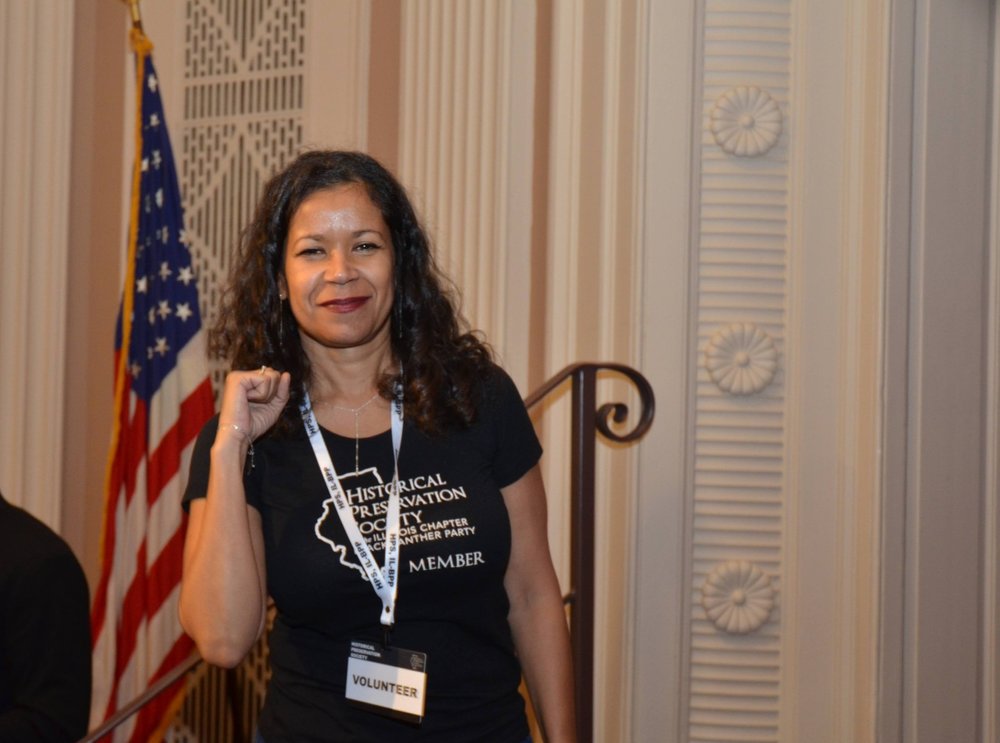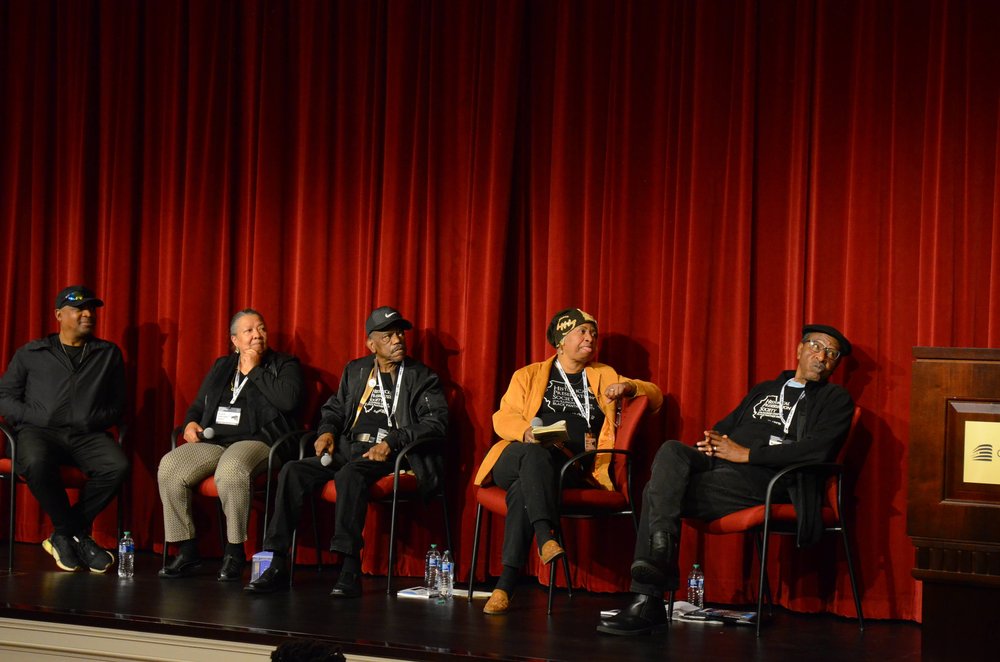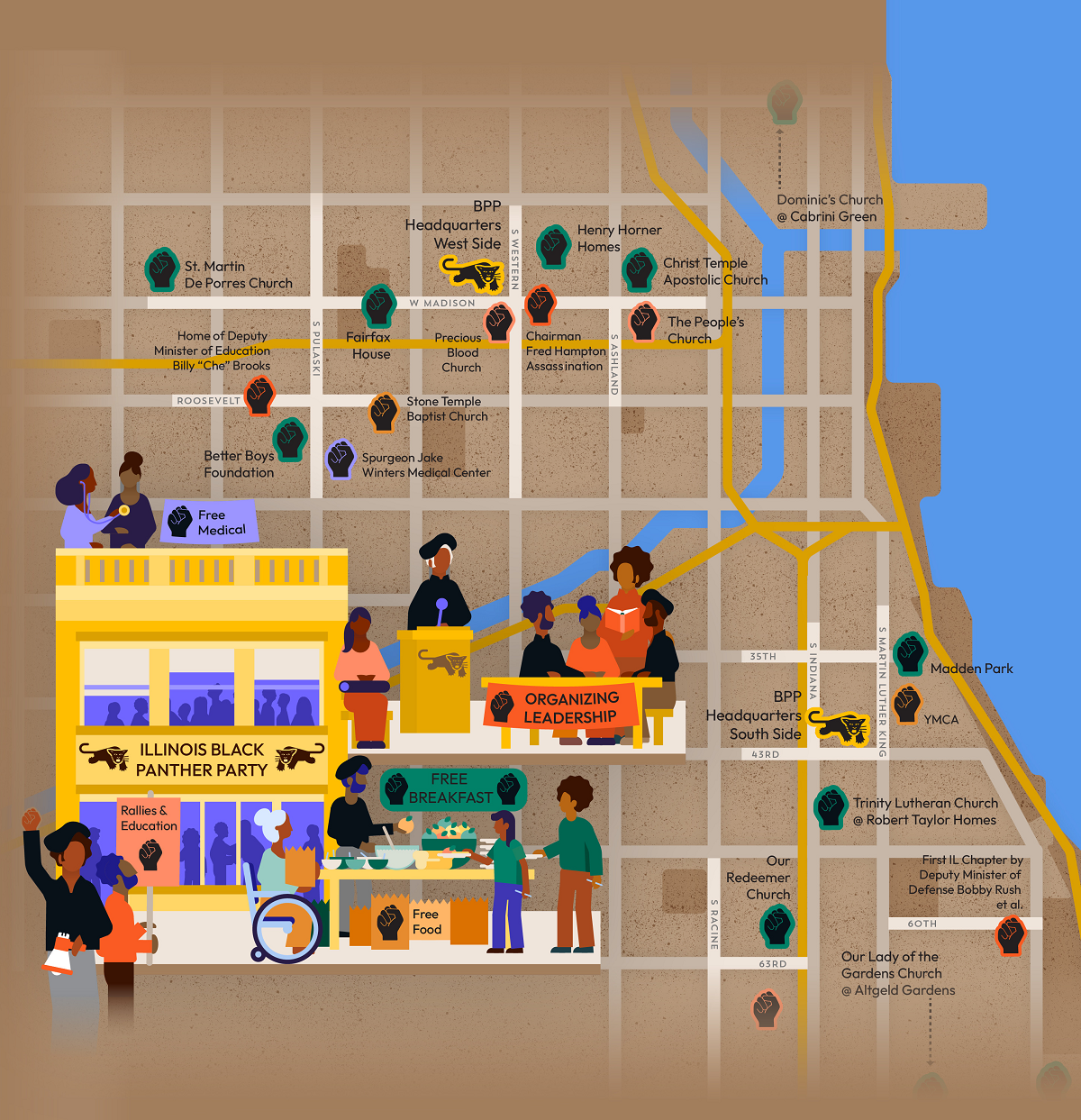Despite the Black Panther Party’s (BPP) nationwide prominence in the political discourse of the 60’s and 70’s, the Panthers’ vast reach and lasting impact has not been sufficiently documented and recognized in Chicago and Illinois. According to local historians, the network of the Chicago-area Panthers—where deputy chairman of the Illinois chapter and national spokesman Fred Hampton was from—is poorly understood largely because the sites of BPP activity have not been preserved, memorialized, or taught as a legitimate part of Chicago history.
The majority of Illinois Panther sites have been demolished or redeveloped and were never given any markers of historical recognition. The Panthers’ main headquarters, for example, located at 2350 W. Madison, is now a Walgreens. The apartment where Hampton and defense captain Mark Clark were killed by Chicago Police was torn down and replaced with another residence bearing the same address. Dozens of Black Panther-led free breakfast program distribution centers and free medical clinics are absent from the historical record.
“The party, to me, has been the victim of a fifty-year smear campaign,” said Leila Wills, co-founder and the executive director of the Historical Preservation Society of the Illinois Chapter of the Black Panther Party, beginning with the government surveillance of and attacks on the Panthers under the FBI program COINTELPRO.
The recently formed non-profit is working to correct the narrative by seeking national landmark recognition of a list of more than eighty sites and properties across the state where the Illinois Black Panthers actively organized between 1968 and 1974.
The list includes the locations where Hampton was killed and his funeral was held, the BPP headquarters and offices, where police raids and shootings took place, and about thirty sites of the Free Breakfast for Children program. “It just became this urgent situation where gentrification is ongoing, that what we stand to lose will be wiped from the city’s history physically, so we don’t want that to happen. And that’s how it started,” Wills said.
Wills grew up knowing that her parents were BPP members in Altgeld Gardens on the South Side. They worked in the breakfast program, at a medical center, and sold newspapers. But by the time she was coming up, “The party didn’t exist anymore, so I can’t really remember them,” she said. “They would just kind of come up [in conversation], especially if we were in the car, my father would say, ‘Yeah, we used to have an office right here’… and so it was there in my head.”

BPP members like John Preston and Wanda Ross are helping Wills to contextualize the significance of some of the sites, she said. Billy “Che” Brooks, co-founder of the Historical Preservation Society and the Deputy Minister of Education for the Illinois chapter, is helping the Historical Preservation Society launch a public awareness campaign to inform the community about the legacy of the chapter and their presence in multiple neighborhoods.
Wills was previously involved in the fundraising efforts to save the Hampton house, led by Fred Hampton Jr. out of his father’s Maywood home, which obtained local landmark recognition in April of this year and will eventually become a full-fledged museum and community center. “That was for the single property, but I still wanted to tell the story of the Illinois chapter by locations because when you start breaking down their locations, each has a significant story with it,” Wills said. “Plus, it just showed how extensive their work was even not including people like the Young Lords and others in the Rainbow Coalition.”
The State Historic Preservation Office is helping the non-profit fill out the necessary paperwork for multiple properties, which they will present to the Springfield office in February 2023 for consideration in the National Register of Historic Places. “We’re starting at the state level,” said Willis, “and then we’re going to be pursuing some landmark status at the city level. Now that’s where I anticipate [opposition], hopefully I’m wrong and that people are ready for this kind of discussion.”
Their current proposal needs to highlight one property from the list of BPP sites. The People’s Church, located at 201 S. Ashland, is already a Chicago landmark under the name Epiphany Center for the Arts. “That was a significant party location, and we are in touch with the people who own it now and, you know, they’re supportive of it,” Wills said. “That was their main meeting place, that was one of the last places Chairman spoke before he was assassinated. That’s where, if you find news articles and you know anything happened, that’s where it happened.”
For structures that no longer exist, the organization plans to get plaques installed at the sites. For structures that are already landmarks, such as the church, they are working to amend their listings to include the history of the Illinois Chapter.
In October, the Historical Preservation Society held an event at the Chicago History Museum for surviving Black Panthers; it was hosted by Chuck D from Public Enemy, and featured special guest and Illinois chapter founding Panther, retiring Congressman Bobby Rush. Young people from Free Spirit Media were some of the most enthusiastic participants, asking most of the questions during a Q&A session after a panel discussion.

“I wanted to do an event in honor of the Illinois chapter and simultaneously begin a public awareness campaign of the landmarking effort that we were doing. It was really my own personal dream to do an event at the Chicago History Museum in honor of the Illinois chapter. And I wanted the Chicago History Museum specifically because that’s what level of conversation the Illinois chapter needs to be on,” Wills said.
The event received support from the Chicago Community Trust, the Center for the Study of Race, Politics, and Culture at the University of Chicago, and St. Sabina Church, among others. A “part 2” event is in the works for December 15 at NEIU’s Jacob H. Carruthers Center for Inner City Studies, 700 East Oakwood Boulevard. Registration is free online at ilbpp.org/events
Jacqueline Serrato is the Weekly’s editor-in-chief.


The idea that the lasting contribution/impact of the Panthers in Chicago hasn’t been sufficiently documented and recognized needs much rethinking. I would argue that Dr. Jakobi Williams’s book of nearly
ten years ago filled the gap to which you refer.
While I can appreciate the efforts of Dr. Jakobi Williams’ book From the Bullet to the Ballot, which is deserving of mention, this is an effort that is deserving of its own attention and support.
I do not think the Hampton family recommends Dr. Williams’ book.
Save The Hampton House is a non profit organization dedicated to protecting and preserving the legacy of Chairman Fred Hampton and the Black Panther Party led and supported by the Hampton family (who have been doing this work for decades). Why no mention in this article??
YASSSSS
I m very interested in joining the Black Panther organization.$$$
I would like tojoin the bath at the party
Vin interested in the black panther party from the 70s
I now live in Chicago